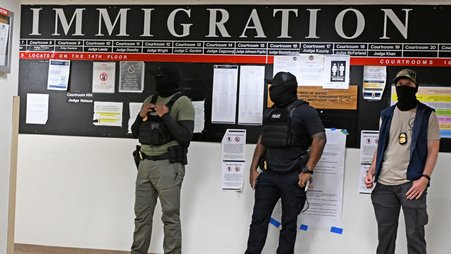Dear Friend of Press Freedom,
Protecting press freedom is protecting democracy — here are the latest issues to know about.
Deportation hearings must be transparent
Nearly 600 people tried to watch an immigration hearing in the case of detained activist and U.S. legal permanent resident Mahmoud Khalil on April 8, only to find themselves shut out of the virtual room.
We led a letter from press freedom organizations to the judge explaining that in-person access in rural Louisiana is not sufficient for a case of major national and international significance like Khalil’s. Interest in the case is only heightened now that the government has filed a memorandum conceding that its only “evidence” against Khalil is of his involvement in protesting the Israel-Gaza war.
The government is likely to assert a similar theory in the case of Rümeysa Öztürk, a Tufts University graduate student who was also abducted by federal agents and brought to Louisiana, in her case apparently over an op-ed she co-authored criticizing the war.
Attacks on law firms are attacks on the press
The Trump administration’s strong-arming of lawyers the president doesn’t like could have significant consequences for those he calls “the enemy of the people”: the press.
That is why 61 media organizations and press freedom advocates, led by The Intercept’s Press Freedom Defense Fund and Freedom of the Press Foundation (FPF), filed a legal brief urging a court to strike down an executive order sanctioning a law firm for representing President Donald Trump’s political opponents.
“Newsrooms are broke and FOIA is broken. Journalists face the threat of SLAPP suits, subpoenas, arrest, and, these days, even deportation, just for doing their jobs,” said Seth Stern, FPF’s advocacy director. “Now more than ever, reporters need access to quality pro bono representation to overcome these obstacles and hold the government accountable. If an anti-free speech president can shake down law firms that represent clients he doesn’t like, press freedom will suffer immeasurably, and the American public will be less informed.”
Read more here. And thanks to the attorneys at Albert Sellars LLP for their great work on the brief and for responding to Trump’s bullying the right way.
Signalgate shows chilling effect of Assange prosecution
There’s been plenty of speculation over how journalist Jeffrey Goldberg found himself on a Signal thread with top-level administration officials. But people don’t seem as curious about an arguably more consequential question: Why did Goldberg leave a chat that could have generated countless important scoops?
Our guess is The Atlantic’s lawyers warned about the Espionage Act — the law used to prosecute WikiLeaks founder Julian Assange for obtaining and publishing government secrets. We should not have a purported “espionage” law on the books that is so vaguely drafted that it could conceivably give an experienced journalist pause when news falls in his lap. Stern has more here.
Firing FOIA officers is not ‘radical transparency’
“Hello, the FOIA office has been placed on admin leave and is unable to respond to any emails.”
This doesn’t sound like “radical transparency” to us.
Check out the latest edition of (and subscribe to) “The Classifieds,” a newsletter by our Daniel Ellsberg Chair on Government Secrecy Lauren Harper, to see which Freedom of Information Act offices have closed, and which might be next.
And read more from Harper about this week’s congressional hearing on FOIA, where no FOIA officers could testify in the midst of widespread closures and firings.
What we’re reading
Judge orders White House ban on AP lifted (The Washington Post). “The judge got it right,” Stern told the Post, “but it should never have taken this long.”
Open letter to chair and ranking member of House Committee on Energy and Commerce (Internet Society). We joined with other rights groups to ask Congress to protect encryption and the journalists who rely on it by fixing the Take It Down Act.
Lawyer for U-M protester detained at airport after spring break trip with family (Detroit Free Press). If this is happening to protesters’ lawyers now, there's no reason to think it won't happen to journalists or lawyers who represent them soon.
US student journalists go dark fearing Trump crusade against pro-Palestinian speech (The Guardian). It’s a sad day in America when student journalists must resign or write anonymously because they fear government reprisals.
D.C. Attorney nominee’s threats against critics of Elon Musk and DOGE mire him in disqualifying ethics scandal (Demand Progress). Ed Martin’s conduct as interim U.S. attorney “shows that he intends to convert the office into a taxpayer-funded law firm for Trump and his friends,” Stern said.
PSA from John Cusack
Democracy is under attack — and paywalls shouldn’t stand in the way of accessing vital public records. Our board member, activist and actor John Cusack, discussed why more news outlets need to follow the lead of Wired and 404 Media and give their public records reporting to the public.





